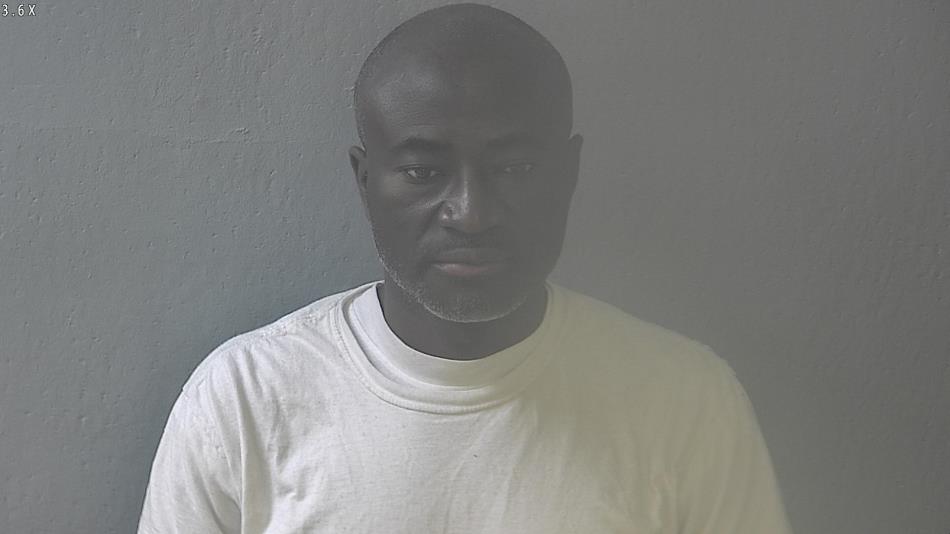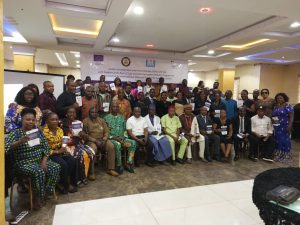Nigerian man sentenced to 2 years in U.S prison for $300,000 romance fraud scheme
In the corridors of cybercrime, where anonymous identities manipulate the vulnerable from behind screens, a story of deception, heartbreak, and justice has emerged. At the center is a 42-year-old Nigerian man, Badetito O. Obafemi, sentenced on April 9, 2025, to two years in a U.S. federal prison for his role in a romance fraud scheme that defrauded elderly victims across three states of more than $300,000.
The sentence was delivered by U.S. Chief District Judge Beth Phillips in the Western District of Missouri, closing a case that detailed a web of online manipulation and financial crime operating from 2016 through 2018.
Obafemi’s case is one of many that reflect a growing digital epidemic — romance scams. These cons target emotionally vulnerable individuals, often the elderly, by luring them into fictitious relationships. Once trust is built, the victims are manipulated into wiring money for fabricated emergencies, such as medical expenses, travel complications, or business setbacks.
YOU MAY READ
Nigerian Hairdresser Sentenced to 5 Years in Ghana for Trafficking Young Women and Forcing Them into Prostitution
According to a statement by the U.S. Attorney’s Office, Obafemi played a pivotal role in facilitating the fraud. He was not the voice or the face of the scam, but rather the person who ensured the money moved efficiently from victims to the hands of the perpetrators. He used his personal and business accounts to launder the funds, making it harder to trace and easier to redistribute to other accomplices.
Three known victims — located in Missouri, Minnesota, and New Jersey — were deceived by romantic partners who never existed. The scammers built elaborate fake identities, engaged in daily communication with the victims, and developed emotional bonds that made their fabricated emergencies seem credible and urgent.
In one of the cases detailed by the court, a Missouri woman believed she was in a romantic relationship with a man named “Kevin Condon,” whom she met through Facebook in 2016. Over time, “Condon” claimed he was facing challenges overseas related to a business venture and personal health issues. The victim ultimately sent $27,460 to help him.
YOU MAY READ
23 Anambra indigenes are on d3ath row in Indonesia over drugs Governor Soludu
There was also an attempted transfer of $40,000 into an account controlled by Obafemi, purportedly to pay a court in South Africa for Condon’s release from jail. Although that transaction was never completed, it demonstrated how the scam evolved from emotional manipulation to full-fledged financial control.
Obafemi’s role was financial. He owned two businesses — EasyTickets, LLC, and Goeasy Logistics, LLC — which served as vehicles to receive and transfer funds. Victims were often instructed to wire money to these businesses under the guise of legitimate payments. This allowed Obafemi to conceal the criminal origins of the funds while directing them to conspirators.
After pleading guilty to conspiracy to commit money laundering in April 2024, Obafemi faced sentencing nearly a year later. The court imposed a 24-month prison sentence, followed by three years of supervised release. Additionally, he was ordered to pay $311,520 in restitution to the victims.
From Dallas, Georgia, Obafemi appeared to live an ordinary life. Business records suggested he was a small-scale entrepreneur. But investigators from Homeland Security Investigations, the FBI, and the Northfield, Minnesota Police Department uncovered his connection to a broader fraud ring with international reach.
YOU MAY READ
Enugu High Court Sentences Federal Hospital Directors To Prison For Contempt
The investigation revealed that Obafemi was part of a transnational network of scammers, many of whom were believed to be based in Nigeria and South Africa. These groups used fake online identities, foreign accents, and borrowed images to mislead victims. Their primary targets were older adults — those who were lonely, trusting, and often not as familiar with the tactics of online fraud.
The prosecution’s case was built largely on the strength of victim testimonies and a detailed forensic trail. One Missouri victim, now in her seventies, shared her story in court, describing how “Kevin Condon” promised her love and a future together. She sent him money believing she was helping a future husband overcome temporary setbacks.
Another victim from New Jersey explained that she withdrew a large portion of her retirement savings to assist a man she had never met in person. She believed he was in trouble in Dubai and needed her help to finalize a business transaction.
Both women expressed shame and embarrassment, but also a desire to help others avoid similar traps. Their testimonies were critical in showing the depth of the emotional and financial damage caused by the fraud.
YOU MAY READ
Court Sentences UNIUYO Professor to Three Years Imprisonment for Electoral Fraud: A Deep Dive into the Case, Legal Ramifications, and Wider Implications
Authorities were first alerted to the scam when a Minnesota bank flagged a suspicious wire transfer. This triggered an investigation by the Northfield Police Department, which escalated the case to federal authorities. HSI and the FBI collaborated to uncover a complex digital trail linking Obafemi to multiple accounts, transactions, and communications with co-conspirators.
Investigators used email records, IP logs, bank statements, and witness interviews to establish Obafemi’s role. They found that he had coordinated the timing of wire transfers, advised conspirators on account usage, and helped redirect funds through shell companies and personal accounts.
The evidence showed Obafemi was not a passive participant. He knew the funds originated from fraudulent schemes, and he worked actively to conceal their origins. While he did not initiate contact with victims, his role was essential to the success of the operation.
At sentencing, his defense attorney argued that Obafemi had no prior criminal record, had accepted responsibility by pleading guilty, and had cooperated with the investigation. However, prosecutors countered that the harm caused by the scam warranted significant punishment.
YOU MAY READ
Nigeria’s Flawed Criminal Justice System: A Case of Injustice
Assistant U.S. Attorney Casey Clark emphasized the broader impact of the crime, noting that romance scams are among the most emotionally destructive frauds, and that Obafemi’s financial management made the crimes possible.
The court sided with the prosecution, imposing a full two-year sentence with no parole, as is standard in federal cases. In addition to prison time, Obafemi must undergo supervised release and work to repay restitution to the victims.
Romance fraud is a growing issue in the United States and globally. According to the Federal Trade Commission, U.S. citizens reported more than $1.3 billion in losses from romance scams in 2023 alone. The majority of these scams originate from overseas, but often involve collaborators or facilitators residing within the United States.
Typically, romance scammers exploit online dating platforms, Facebook, or email. They build emotional connections quickly, using flattering language, daily communication, and carefully crafted stories. The goal is to gain trust and make the victim emotionally dependent, so that financial requests feel justified rather than suspicious.
Red flags often include reluctance to meet in person, frequent travel excuses, vague or shifting personal details, and a sudden crisis requiring money. Many victims ignore these signs, convinced by the emotional connection and the hope of a meaningful relationship.
YOU MAY READ
Police officer found guilty in tragic nursing home death of 95-year-old woman, at Sydney Australia
Psychologists studying victims of romance fraud note that the emotional impact is often comparable to post-traumatic stress. Victims experience betrayal, grief, and shame. Some become socially withdrawn, while others fall into financial hardship or depression.
Support groups and advocacy organizations have emerged to help victims recover. These include RomanceScams.org and the Society of Citizens Against Relationship Scams (SCARS). They offer counseling, legal resources, and community forums for survivors to share their experiences and learn prevention tactics.
Internationally, Nigerian authorities have faced criticism for being a breeding ground for online fraud. However, in recent years, the Nigerian government has taken steps to address the issue. The Economic and Financial Crimes Commission (EFCC) has increased investigations and arrests, particularly of young people involved in so-called “Yahoo Yahoo” scams.
Collaborations between the EFCC, FBI, and Interpol have led to the extradition of several suspects. Nonetheless, the problem persists due to the high financial returns and limited economic opportunities available to many young Nigerians.
Obafemi’s case highlights the diaspora’s role in facilitating fraud. While some perpetrators are based in Nigeria or other African nations, others reside in the U.S., Europe, or Canada, serving as intermediaries who receive and move funds.
YOU MAY READ
Richest Family in Britain Brought to Justice: Hinduja Family Members Jailed for Exploiting Indian Servants
For law enforcement, identifying and arresting these middlemen is a critical part of stopping fraud at its roots. By disrupting the flow of money, they can make scams less profitable and more risky.
While the case against Obafemi has concluded, the victims’ journeys toward healing are ongoing. Some have begun to speak publicly about their experiences, hoping to raise awareness and reduce the stigma associated with falling for a scam.
Law enforcement agencies continue to educate the public, especially older Americans, on how to recognize and report romance scams. Tools such as scam reporting websites, hotlines, and educational seminars are being used to combat the threat.
The takeaway from Obafemi’s conviction is sobering. In a world increasingly dependent on digital communication, fraudsters have unprecedented access to the private lives and emotions of millions. Trust, once a cornerstone of human relationships, is now a vulnerability that scammers weaponize.
However, justice can be served. With inter-agency cooperation, digital forensics, and courageous testimony from victims, even the most elusive crimes can be exposed and prosecuted.
As Obafemi begins his sentence, it is a reminder to individuals everywhere: relationships, like all matters of the heart, deserve care and caution. Verify identities. Ask questions. And remember that real love never requires urgent wire transfers or secret bank accounts.
The road to recovery for the victims may be long, but their willingness to speak up has helped shine a light on an underreported and deeply personal form of crime. And for the justice system, it is proof that the fight against cyber fraud, though complex, is not beyond reach.





